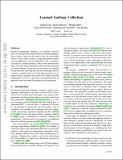Notice
This is not the latest version of this item. The latest version can be found at:https://dspace.mit.edu/handle/1721.1/132291.3
Learned garbage collection
| dc.contributor.author | Cen, Lujing | |
| dc.contributor.author | Marcus, Ryan | |
| dc.contributor.author | Mao, Hongzi | |
| dc.contributor.author | Gottschlich, Justin | |
| dc.contributor.author | Alizadeh, Mohammad | |
| dc.contributor.author | Kraska, Tim | |
| dc.date.accessioned | 2022-07-18T20:40:56Z | |
| dc.date.available | 2021-09-20T18:21:42Z | |
| dc.date.available | 2022-07-18T20:40:56Z | |
| dc.date.issued | 2020-06 | |
| dc.identifier.uri | https://hdl.handle.net/1721.1/132291.2 | |
| dc.description.abstract | © 2020 Owner/Author. Several programming languages use garbage collectors (GCs) to automatically manage memory for the programmer. Such collectors must decide when to look for unreachable objects to free, which can have a large performance impact on some applications. In this preliminary work, we propose a design for a learned garbage collector that autonomously learns over time when to perform collections. By using reinforcement learning, our design can incorporate user-defined reward functions, allowing an autonomous garbage collector to learn to optimize the exact metric the user desires (e.g., request latency or queries per second). We conduct an initial experimental study on a prototype, demonstrating that an approach based on tabular Q learning may be promising. | en_US |
| dc.language.iso | en | |
| dc.publisher | ACM | en_US |
| dc.relation.isversionof | 10.1145/3394450.3397469 | en_US |
| dc.rights | Creative Commons Attribution-Noncommercial-Share Alike | en_US |
| dc.rights.uri | http://creativecommons.org/licenses/by-nc-sa/4.0/ | en_US |
| dc.source | arXiv | en_US |
| dc.title | Learned garbage collection | en_US |
| dc.type | Article | en_US |
| dc.contributor.department | Massachusetts Institute of Technology. Computer Science and Artificial Intelligence Laboratory | en_US |
| dc.contributor.department | Massachusetts Institute of Technology. Department of Electrical Engineering and Computer Science | en_US |
| dc.relation.journal | MAPL 2020 - Proceedings of the 4th ACM SIGPLAN International Workshop on Machine Learning and Programming Languages, co-located with PLDI 2020 | en_US |
| dc.eprint.version | Original manuscript | en_US |
| dc.type.uri | http://purl.org/eprint/type/ConferencePaper | en_US |
| eprint.status | http://purl.org/eprint/status/NonPeerReviewed | en_US |
| dc.date.updated | 2021-01-11T18:05:28Z | |
| dspace.orderedauthors | Cen, L; Marcus, R; Mao, H; Gottschlich, J; Alizadeh, M; Kraska, T | en_US |
| dspace.date.submission | 2021-01-11T18:05:37Z | |
| mit.license | OPEN_ACCESS_POLICY | |
| mit.metadata.status | Publication Information Needed | en_US |
